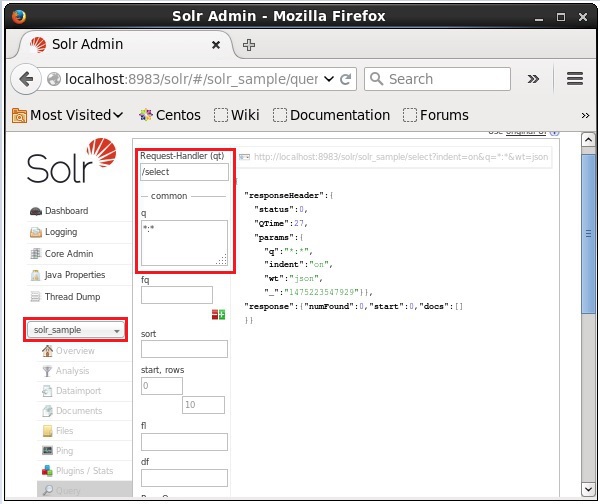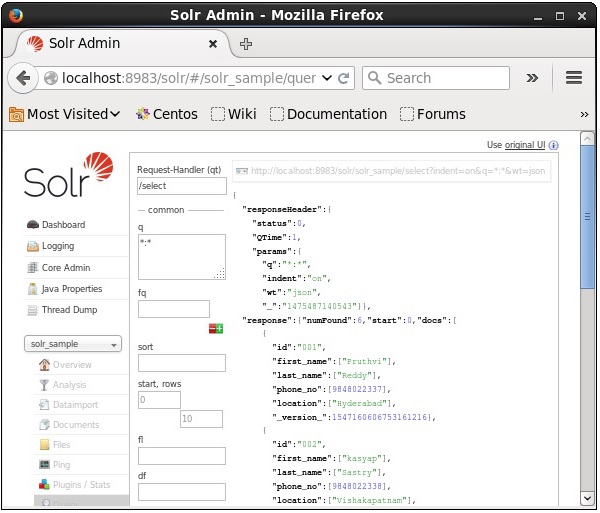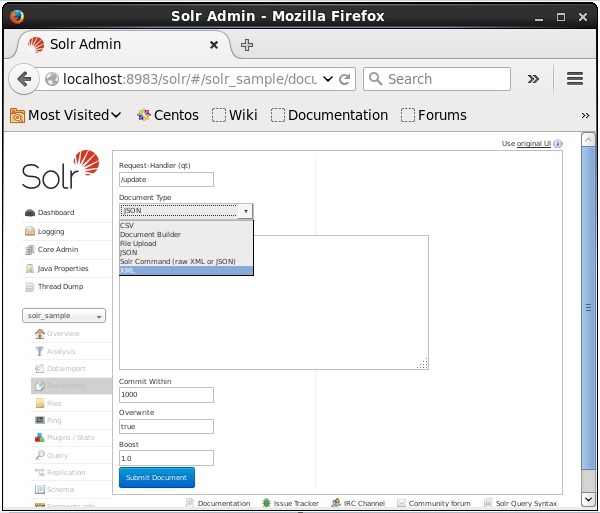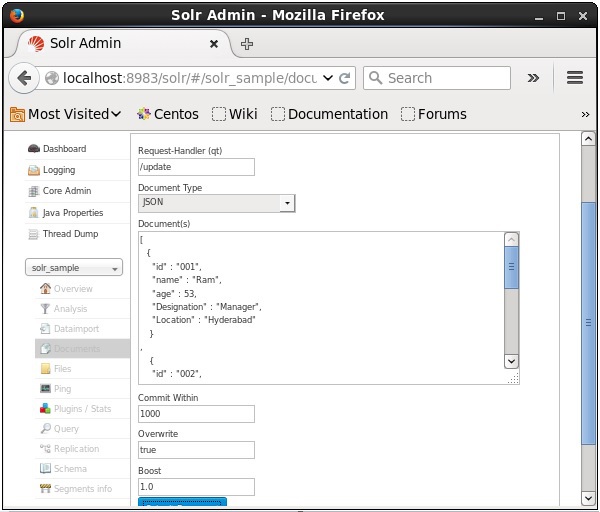
- Apache Solr 教程
- Apache Solr - 主页
- Apache Solr - 概述
- Apache Solr - 搜索引擎基础知识
- Apache Solr - Windows 环境
- Apache Solr - 在 Hadoop 上
- Apache Solr - 架构
- Apache Solr - 术语
- Apache Solr - 基本命令
- Apache Solr - 核心
- Apache Solr - 索引数据
- Apache Solr - 添加文档 (XML)
- Apache Solr - 更新数据
- Apache Solr - 删除文档
- Apache Solr - 检索数据
- Apache Solr - 查询数据
- Apache Solr - 分面
- Apache Solr 有用资源
- Apache Solr - 快速指南
- Apache Solr - 有用的资源
- Apache Solr - 讨论
Apache Solr - 索引数据
一般来说,索引是对文档或(其他实体)的系统排列。索引使用户能够在文档中查找信息。
索引收集、解析和存储文档。
建立索引是为了提高搜索查询的速度和性能,同时查找所需的文档。
Apache Solr 中的索引
在Apache Solr中,我们可以索引(添加、删除、修改)各种文档格式,例如xml、csv、pdf等。我们可以通过多种方式将数据添加到Solr索引中。
在本章中,我们将讨论索引 -
- 使用 Solr Web 界面。
- 使用任何客户端 API,如 Java、Python 等。
- 使用后期工具。
在本章中,我们将讨论如何使用各种接口(命令行、Web 界面和 Java 客户端 API)将数据添加到 Apache Solr 的索引中
使用 Post 命令添加文档
Solr在其bin/目录中有一个post命令。使用此命令,您可以在 Apache Solr 中索引各种格式的文件,例如 JSON、XML、CSV。
浏览Apache Solr的bin目录并执行post命令的-h选项,如以下代码块所示。
[Hadoop@localhost bin]$ cd $SOLR_HOME [Hadoop@localhost bin]$ ./post -h
执行上述命令后,您将获得post 命令的选项列表,如下所示。
Usage: post -c <collection> [OPTIONS] <files|directories|urls|-d [".."]>
or post –help
collection name defaults to DEFAULT_SOLR_COLLECTION if not specified
OPTIONS
=======
Solr options:
-url <base Solr update URL> (overrides collection, host, and port)
-host <host> (default: localhost)
-p or -port <port> (default: 8983)
-commit yes|no (default: yes)
Web crawl options:
-recursive <depth> (default: 1)
-delay <seconds> (default: 10)
Directory crawl options:
-delay <seconds> (default: 0)
stdin/args options:
-type <content/type> (default: application/xml)
Other options:
-filetypes <type>[,<type>,...] (default:
xml,json,jsonl,csv,pdf,doc,docx,ppt,pptx,xls,xlsx,odt,odp,ods,ott,otp,ots,
rtf,htm,html,txt,log)
-params "<key> = <value>[&<key> = <value>...]" (values must be
URL-encoded; these pass through to Solr update request)
-out yes|no (default: no; yes outputs Solr response to console)
-format Solr (sends application/json content as Solr commands
to /update instead of /update/json/docs)
Examples:
* JSON file:./post -c wizbang events.json
* XML files: ./post -c records article*.xml
* CSV file: ./post -c signals LATEST-signals.csv
* Directory of files: ./post -c myfiles ~/Documents
* Web crawl: ./post -c gettingstarted http://lucene.apache.org/Solr -recursive 1 -delay 1
* Standard input (stdin): echo '{commit: {}}' | ./post -c my_collection -
type application/json -out yes –d
* Data as string: ./post -c signals -type text/csv -out yes -d $'id,value\n1,0.47'
例子
假设我们有一个名为sample.csv的文件,其中包含以下内容(在bin目录中)。
| 学生卡 | 名 | 姓氏 | 电话 | 城市 |
|---|---|---|---|---|
| 001 | 拉吉夫 | 雷迪 | 9848022337 | 海得拉巴 |
| 002 | 悉达多 | 巴塔查亚 | 9848022338 | 加尔各答 |
| 003 | 拉杰什 | 卡纳 | 9848022339 | 德里 |
| 004 | 普雷蒂 | 阿加瓦尔 | 9848022330 | 浦那 |
| 005 | 特鲁普蒂 | 莫汉蒂 | 9848022336 | 布巴内斯瓦尔 |
| 006 | 阿卡纳 | 米斯拉 | 9848022335 | 钦奈 |
上面的数据集包含个人详细信息,例如学生 ID、名字、姓氏、电话和城市。数据集的 CSV 文件如下所示。在这里,您必须注意,您需要提及架构,记录其第一行。
id, first_name, last_name, phone_no, location 001, Pruthvi, Reddy, 9848022337, Hyderabad 002, kasyap, Sastry, 9848022338, Vishakapatnam 003, Rajesh, Khanna, 9848022339, Delhi 004, Preethi, Agarwal, 9848022330, Pune 005, Trupthi, Mohanty, 9848022336, Bhubaneshwar 006, Archana, Mishra, 9848022335, Chennai
您可以使用post命令在名为example_Solr的核心下索引此数据,如下所示 -
[Hadoop@localhost bin]$ ./post -c Solr_sample sample.csv
执行上述命令时,给定文档在指定核心下建立索引,生成以下输出。
/home/Hadoop/java/bin/java -classpath /home/Hadoop/Solr/dist/Solr-core 6.2.0.jar -Dauto = yes -Dc = Solr_sample -Ddata = files org.apache.Solr.util.SimplePostTool sample.csv SimplePostTool version 5.0.0 Posting files to [base] url http://localhost:8983/Solr/Solr_sample/update... Entering auto mode. File endings considered are xml,json,jsonl,csv,pdf,doc,docx,ppt,pptx,xls,xlsx,odt,odp,ods,ott,otp,ots,rtf, htm,html,txt,log POSTing file sample.csv (text/csv) to [base] 1 files indexed. COMMITting Solr index changes to http://localhost:8983/Solr/Solr_sample/update... Time spent: 0:00:00.228
使用以下 URL 访问 Solr Web UI 的主页 -
http://本地主机:8983/
选择核心Solr_sample。默认情况下,请求处理程序是/select,查询是“:”。不进行任何修改,单击页面底部的ExecuteQuery按钮。

执行查询时,您可以观察 JSON 格式(默认)的索引 CSV 文档的内容,如以下屏幕截图所示。

注意- 以同样的方式,您可以索引其他文件格式,例如 JSON、XML、CSV 等。
使用 Solr Web 界面添加文档
您还可以使用 Solr 提供的 Web 界面来索引文档。让我们看看如何索引以下 JSON 文档。
[
{
"id" : "001",
"name" : "Ram",
"age" : 53,
"Designation" : "Manager",
"Location" : "Hyderabad",
},
{
"id" : "002",
"name" : "Robert",
"age" : 43,
"Designation" : "SR.Programmer",
"Location" : "Chennai",
},
{
"id" : "003",
"name" : "Rahim",
"age" : 25,
"Designation" : "JR.Programmer",
"Location" : "Delhi",
}
]
步骤1
使用以下 URL 打开 Solr Web 界面 -
http://本地主机:8983/
第2步
选择核心Solr_sample。默认情况下,Request Handler、Common Within、Overwrite 和 Boost 字段的值分别为 /update、1000、true 和 1.0,如下图所示。

现在,从 JSON、CSV、XML 等中选择您想要的文档格式。在文本区域中键入要索引的文档,然后单击“提交文档”按钮,如下面的屏幕截图所示。

使用 Java 客户端 API 添加文档
以下是将文档添加到 Apache Solr 索引的 Java 程序。将此代码保存在名为AddingDocument.java 的文件中。
import java.io.IOException;
import org.apache.Solr.client.Solrj.SolrClient;
import org.apache.Solr.client.Solrj.SolrServerException;
import org.apache.Solr.client.Solrj.impl.HttpSolrClient;
import org.apache.Solr.common.SolrInputDocument;
public class AddingDocument {
public static void main(String args[]) throws Exception {
//Preparing the Solr client
String urlString = "http://localhost:8983/Solr/my_core";
SolrClient Solr = new HttpSolrClient.Builder(urlString).build();
//Preparing the Solr document
SolrInputDocument doc = new SolrInputDocument();
//Adding fields to the document
doc.addField("id", "003");
doc.addField("name", "Rajaman");
doc.addField("age","34");
doc.addField("addr","vishakapatnam");
//Adding the document to Solr
Solr.add(doc);
//Saving the changes
Solr.commit();
System.out.println("Documents added");
}
}
通过在终端中执行以下命令来编译上述代码 -
[Hadoop@localhost bin]$ javac AddingDocument [Hadoop@localhost bin]$ java AddingDocument
执行上述命令后,您将得到以下输出。
Documents added